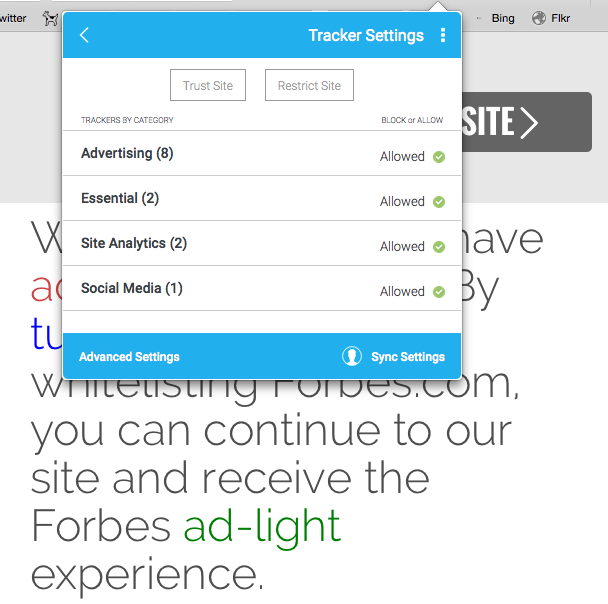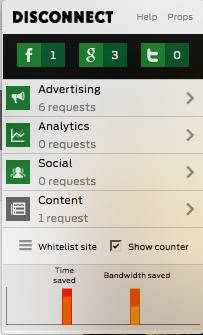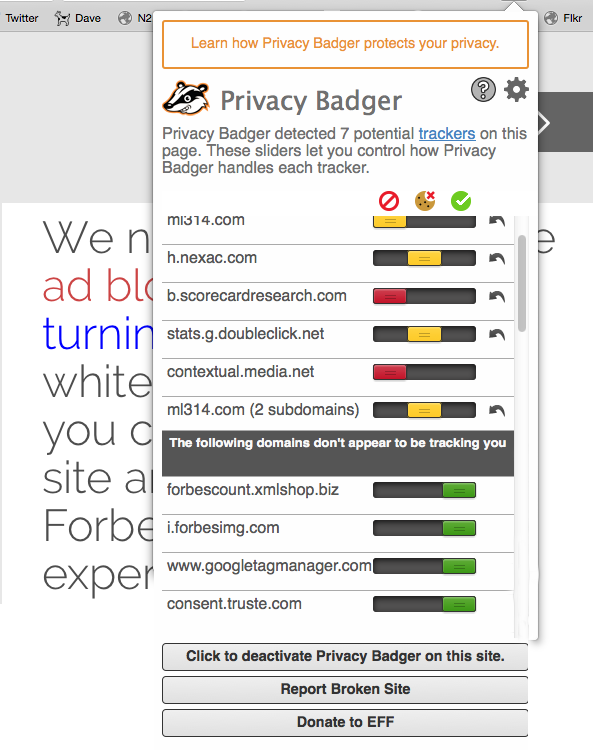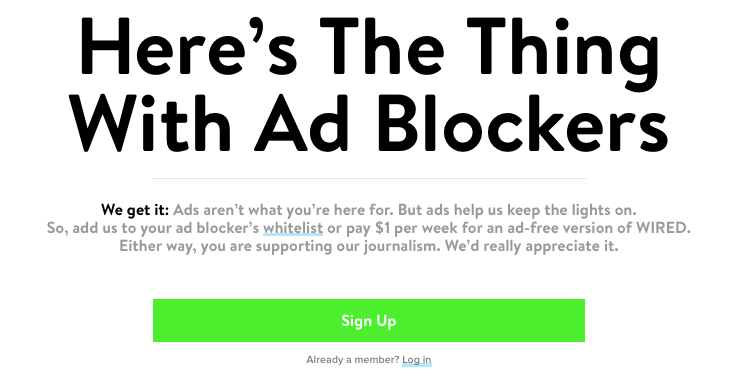[Update: 29 June 2016 — Forbes has backed off, but Wired hasn’t yet. So the invitation stands. So does a path forward.]
![]()
A few days ago, I followed this link at Digg to Forbes, where I was met by the message above.
Problem is, I don’t have an ad blocker installed. I have tracking protection. Three kinds, in fact. (Let me explain: my work requires experimenting with many different privacy protection tools. It just happens that right now I have these three working in Firefox, my default browser.) Here is what Ghostery sees:

Here is what Disconnect sees:

And here is what Privacy Badger sees:

So I’m guessing what blocked the ad was one of the two red sliders in Privacy Badger. I slid the b.scorecardresearch.com one to yellow and it seemed to load the desired page without a problem, but I don’t know if Forbes would have let me though anyway or not . I dunno how to tell what did what.
Then today I ran into the same thing at Wired, looking for some of my own words there. Here’s the roadblock Wired put in my path:

Again, I’m not blocking ads. I’m just trying to block tracking. I also just checked, and Disconnect, Ghostery and Privacy Badger are each doing nothing, far as I can tell, to block anything on Wired. They’re all green-lighting everything. That means they’ve already whitelisted it. Yet Wired thinks I’m blocking ads.
As it happens I‘ve been a Wired subscriber for the duration. But, when I log in (by clicking on the link above), it takes me to a billing page. There it wants to charge me $3.99 every four weeks, which comes to about $52 a year, on top of what I’m already paying for the print publication, which (I would hope) ought to give me access to the same thing online. Very confusing.
Thing is, I don’t mind ads. I even like some of them. Back in the last millennium, I was a partner in Hodskins Simone & Searls, one of Silicon Valley’s top advertising agencies.
And, like most readers, I want publishers to make money.
But I also believe publishers don’t need to do that by tracking me in ways I neither like nor approve. They can give me ads on their pages that are perfectly safe, just like the ads that have funded print magazines for the duration. Those were always respectful of people’s privacy, and don’t rely on a herd of third parties following people around while they go about their lives. They were also more valuable, because they sent clear creative and economic signals, both uncompromised by suspicions of surveillance and other forms of bad acting.
Here is what Joshua Bernstein (@JoshuaBernstein), sourcing Wired‘s Mark McClusky (@markmcc), reported in Bloomberg about what the magazine is trying to do here:
More than 1 in 5 people who visit Wired Magazine’s website use ad-blocking software. Starting in the next few weeks, the magazine will give those readers a choice: stop blocking ads, pay to look at a version of the site that is unsullied by advertisements, or go away…
Wired plans to charge $3.99 for four weeks of ad-free access to its website. In many places where ads appear, the site will simply feature more articles, said Mark McClusky, the magazine’s head of product and business development. The portion of his readership that uses ad blockers are likely to be receptive to a discussion about their responsibility to support the businesses they rely on for information online, McClusky said.
There are legitimate reasons that people use ad blockers, according to McClusky, like a desire to speed up web browsing or not wanting to be tracked online. But Wired has bills to pay. “I think people are ready to have that conversation in a straightforward way,” he said.
This post is part of that conversation. So is what I’ve been writing over the last eight years on what we’ve recently come to call the “adblock war.”
The reason this is a “war,” and it’s impossible for publishers on their own to make peace, is that the only solutions that can scale are the individual reader’s. Ad blockers and tracking protection in browsers all work for the individual, giving everybody scale. Roadblocks and tollbooths like Forbes’ and Wired’s piss readers off, drive them away, or both. Worse, every one of them is different, which is kind of an anti-scale way of doing things.
At this early stage, however, none of the solutions that scale for individuals also work in ways that are friendly to publishers. (Nor do what the browser makers are doing on their own—each differently, which is also anti-scale.)
So we need to take another step, again from the individual’s side, this time with an olive branch.
And that’s what we’ll do at VRM Day (25 April) and IIW(26–28 April), both at the Computer History Museum in Silicon Valley. I invite Forbes, Wired, and all publishers, advertisers, agencies, browser makers and other parties interested in peace to come join us there.
On the table is an easy solution: simple publisher-friendly preference a reader can assert and a publisher can agree to. It says, “Just show me ads not based on tracking me” — or words to that effect, which we’ll work out. (Update: we’ve dubbed this the #NoStalking offer.)
This term will be standard and enabled by code on both the client and server side. The standard and code will live at Customer Commons, which is built for that purpose, on the Creative Commons mode, which has worked well for many years. (And, like ProjectVRM, was hatched at the Berkman Center.) Some of the code already exists. We’ll start writing the rest at IIW next week.
Both VRM Day and IIW are unconferences. No keynotes, no panels, no sponsor exhibits. Everything happens at breakouts, all of which are topics chosen and led by participants. VRM Day is for presenting and planning the work we’ll be doing over the next three days at IIW. We do two IIWs per year, and this is our 22nd. I don’t know any gathering that is more leveraged for getting stuff done. Register here.
For more background on the peace we can forge together, see here and here.
Leave a Reply